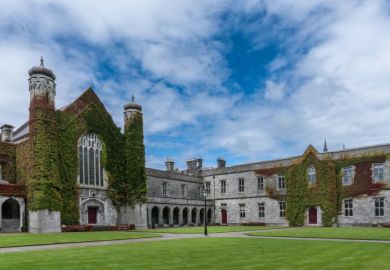More than three-quarters of arts and humanities departmental representatives for Athena SWAN say that the equality charter has led to an “excessive” workload.
The results come from a recent survey of UK-based staff who have participated in the flagship gender equity programme, which is being reviewed amid concerns that its red tape requirements have become burdensome.
Julia Buckingham, vice-chancellor and president of Brunel University London, will chair the independent review of Athena SWAN for Advance HE, the professional development body that has taken responsibility for the scheme since the merger of the Equality Challenge Unit with the Higher Education Academy and the Leadership Foundation for Higher Education in March.
According to the poll conducted by Abigail Woods, head of King’s College London’s history department, and Alana Harris, a history lecturer at King’s, as part of a study commissioned by Advance HE, 77 per cent of respondents agreed that the workload associated with Athena SWAN was “excessive” and 78 per cent described the application process as “time-consuming”.
Some 43 per cent of the 38 respondents also said that they had received no recognition for their Athena SWAN work.
However, 70 per cent agreed that the work was “engaging”, while 60 per cent agreed that it was “community building” and 78 per cent said that the Athena SWAN application process was “enlightening”.
The Athena SWAN charter, which began in the UK in 2005 with 10 founding members focused on science, was expanded in 2015 to include arts, humanities, social science, business and law departments. It now has 145 institutional members and 731 award-holding institutions and departments, and has since been adopted by Australia and the Republic of Ireland, with a pilot under way in the US.
However, some academics have recently voiced criticism of the impact of the awards. Writing for Times Higher Education earlier this month, Rebecca Harrison, lecturer in film and television at the University of Glasgow, said that she had resigned from her role supporting Athena SWAN in her department because “bureaucratic exercises in box-ticking” had not led to meaningful change on key equity issues.
“We must stop filling in forms and instead focus on forming coalitions that will take action and bring about real change,” said Dr Harrison, who urged others to boycott the awards.
Professor Buckingham, whose steering group will complete its work in early 2019, said that she was “very passionate” about Athena SWAN, but that the review would “provide an opportunity to reconsider its scope, which has evolved considerably in recent years, as well as the application and review processes”.
The review would ensure that the awards would “continue to be recognised as a hallmark of gender equality while reducing the burden of the awards application process”, added Professor Buckingham.
Alison Johns, chief executive of Advance HE, said that she had heard “positive feedback that Athena SWAN has enhanced careers and opportunities for many academics” and believed the review would ensure that it “continues to be a highly valued accreditation within the sector”.
Ms Johns added, however, that “there has also been feedback from institutions asking for the charter to be reviewed to ensure it maintains its rigour and credibility, whilst reducing the administrative burden”.
Register to continue
Why register?
- Registration is free and only takes a moment
- Once registered, you can read 3 articles a month
- Sign up for our newsletter
Subscribe
Or subscribe for unlimited access to:
- Unlimited access to news, views, insights & reviews
- Digital editions
- Digital access to THE’s university and college rankings analysis
Already registered or a current subscriber?







